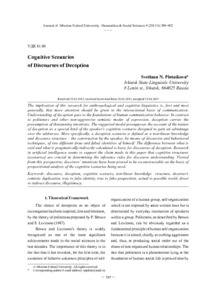Показать сокращенную информацию
Когнитивные сценарии обмана и их дискурсивная реализация
| Автор | Plotnikova, Svetlana N. | en |
| Автор | Плотникова, С.Н. | ru |
| Дата внесения | 2013-04-29T10:24:58Z | |
| Дата, когда ресурс стал доступен | 2013-04-29T10:24:58Z | |
| Дата публикации | 2013-04 | en |
| URI (для ссылок/цитирований) | https://elib.sfu-kras.ru/handle/2311/9722 | |
| Аннотация | The implication of this research for anthropological and cognitive linguistics is, first and most generally, that more attention should be given to the interactional basis of communication. Understanding of deception goes to the foundations of human communicative behavior. In contrast to politeness and other non-aggressive semiotic modes of expression, deception carries the presumption of threatening intentions. The suggested model presupposes the account of the nature of deception as a special kind of the speaker’s cognitive scenario designed to gain an advantage over the addressee. More specifically, a deception scenario is defined as a non-linear knowledge and discourse structure – the construction by the speaker, by means of discursive and behavioral techniques, of two different (true and false) identities of himself. The difference between what is said and what is pragmatically indirectly calculated is basic for discourses of deception. Research in artificial intelligence seems to support the claim made in this paper that cognitive structures (scenarios) are crucial in determining the inference rules for discourse understanding. Viewed from this perspective, deceivers’ intentions have been proved to be reconstructable on the basis of propositional analysis of the cognitive scenarios being used. | en |
| Аннотация | В статье доказывается, что исследование обмана является важной составной частью изучения интерактивных параматров коммуникации. Обман, направленный на выражение враждебных интенций, противопоставляется вежливости и другим неагрессивным типам коммуникативного поведения. Выявляется когнитивная природа обмана – лежащий в его основе особый когнитивный сценарий, представляющий собой нелинейную структуру знания, отражающую семиотическое удвоение обманывающего: одновременную реализацию его истинной и фальшивой идентичности. Определяется алгоритм дискурсивного конструирования фальшивой идентичности: замена действительного мира возможным, прямого дискурса – непрямым. Анализируется механизм последовательного дискурсивного выражения ложных пропозиций в трех базовых типах когнитивных сценариев обмана. | ru |
| Язык | en | en |
| Издатель | Сибирский федеральный университет. Siberian Federal University. | en |
| Является частью серии | 2013 6 ( 4 ) | en |
| Является частью серии | Журнал Сибирского федерального университета. Гуманитарные науки. Journal of Siberian Federal University. Humanities & Social Sciences. | en |
| Тема | discourse | en |
| Тема | deception | en |
| Тема | cognitive scenario | en |
| Тема | non-linear knowledge structure | en |
| Тема | deceiver’s semiotic duplication | en |
| Тема | true vs false identity | en |
| Тема | true vs false proposition | en |
| Тема | actual vs possible world | en |
| Тема | direct vs indirect discourse | en |
| Тема | illegitimacy | en |
| Тема | дискурс | en |
| Тема | обман | en |
| Тема | когнитивный сценарий | en |
| Тема | нелинейная структура знаний | en |
| Тема | семиотическое удвоение обманывающего | en |
| Тема | истинная vs фальшивая идентичность | en |
| Тема | истинная vs ложная пропозиция | en |
| Тема | действительный vs возможный | en |
| Тема | прямой vs непрямой дискурс | en |
| Тема | нелегитимность | en |
| Название | Когнитивные сценарии обмана и их дискурсивная реализация | ru |
| Альтернативное название | Cognitive Scenarios of Discourses of Deception | en |
| Тип | Journal Article | |
| Тип | Published Journal Article | |
| Контакты автора | Plotnikova, Svetlana N.: Irkutsk State Linguistic University, 8 Lenin st., Irkutsk, 664025 Russia; e-mail: snplotn@mail.ru | en |
| Контакты автора | Плотникова, С.Н.: Иркутский государственный лингвистический университет, Россия 664025, Иркутск, ул. Ленина 8; e-mail: snplotn@mail.ru | ru |
| Страницы | 589-602 | en |

